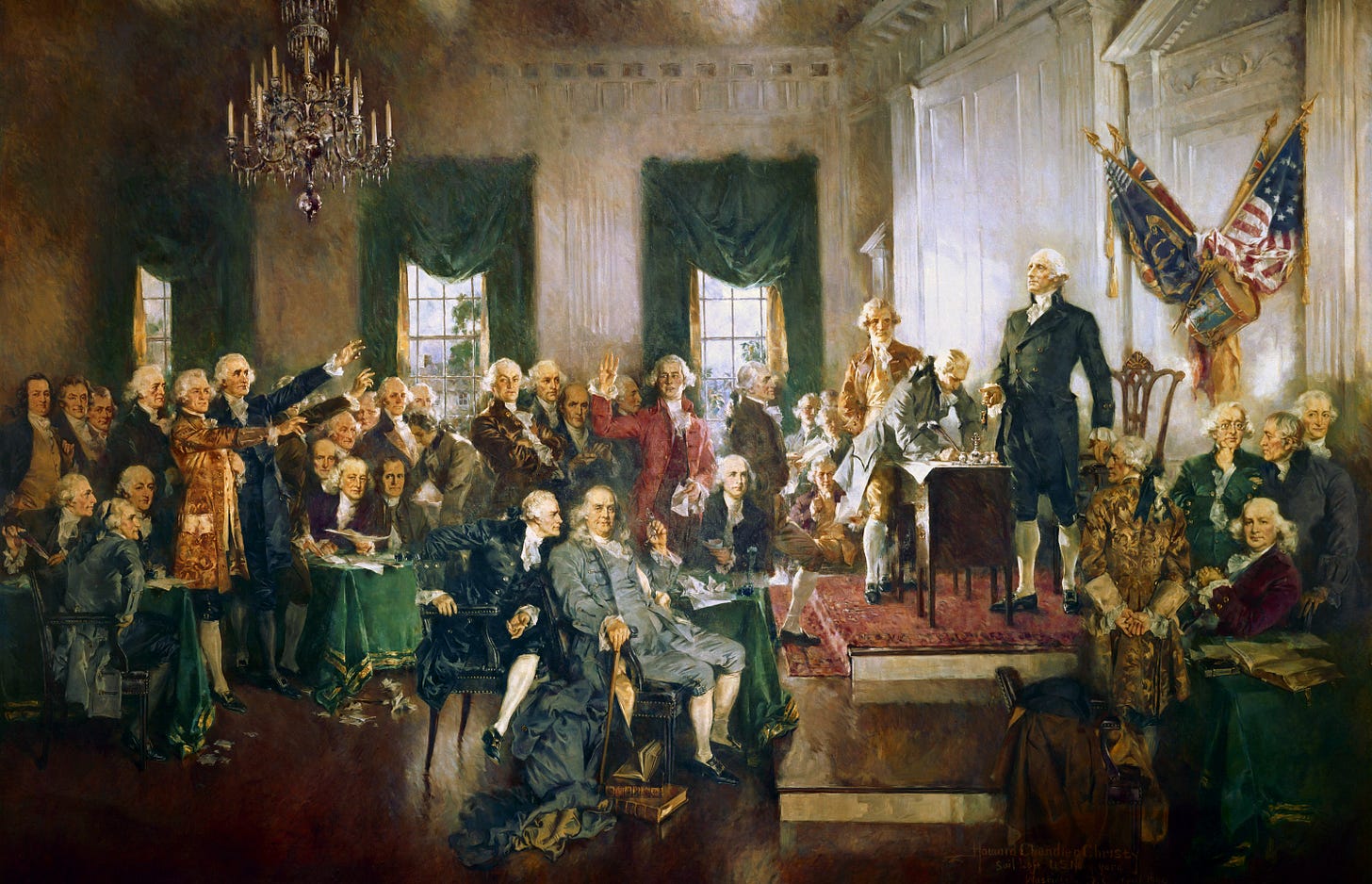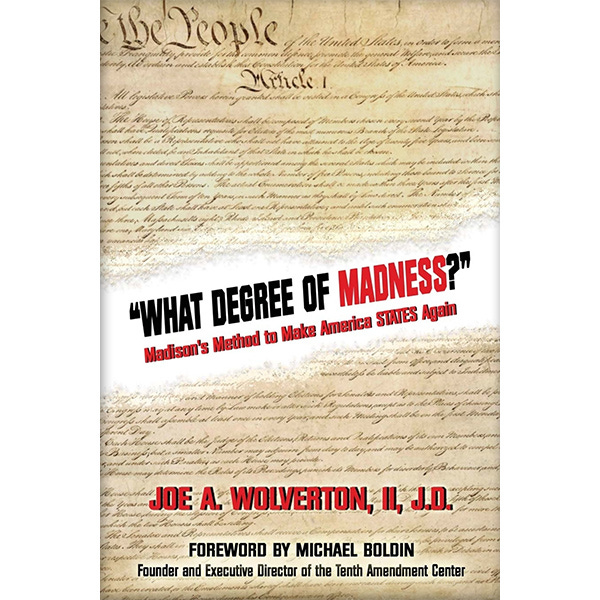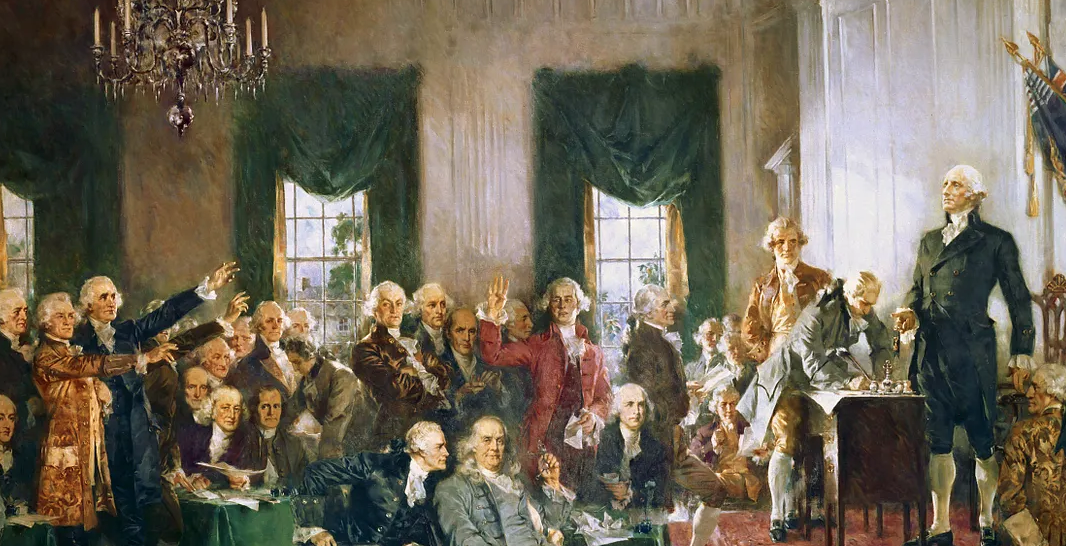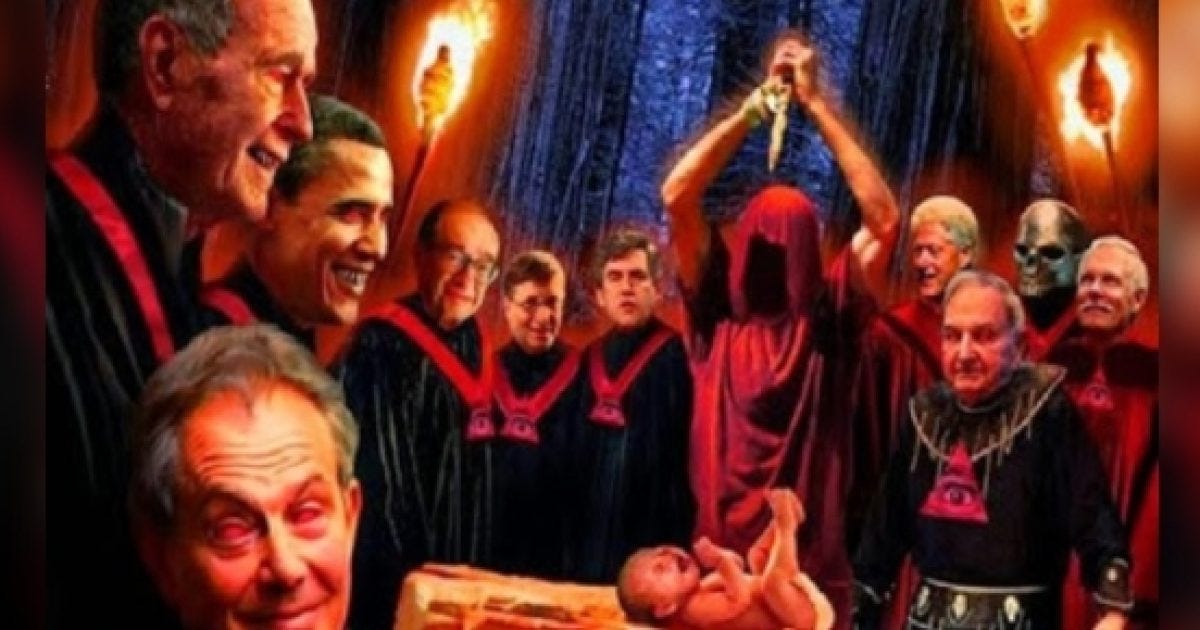Why do we stand the implosion of the Constitution? The same way as the 9/11 controlled demolition psy-op !

About the 9/11 controlled demolition of 8 towers with only 2 “planes”, read this.
Though this article is centered in the USA, it’s also important for all those countries copying the main principles of the US Constitution. This is just a very limited list:
Albania
Argentina
Australia
Austria
Bolivia
Brazil
Canada
Chile
Colombia
Costa Rica
Czechoslovakia (historical)
Ecuador
El Salvador
Germany
Guatemala
Honduras
Hungary (post-1989)
India
Japan
Liberia
Malaysia
Mexico
Nicaragua
Nigeria
Paraguay
Peru
Philippines
Poland (post-1989)
Romania (post-1989)
Russia (post-1993)
South Africa (post-1994)
South Korea
Switzerland
Uruguay
Venezuela
Every year, the USA celebrates Constitution Day, signed on September 17, 1787.
Let’s take advantage to speak out about why and how the Constitution is being violated on a systematic basis, just as in all those countries.
Conspiracy fact: how vast an organization could be, to be able to hide a ratified Amendment for over 200 years?
The ghosted 13th amendment was ratified by the required 2/3 of States (12 out of the then 16).
If in a hurry, search for TONA in this article:
That article is the ultimate proof that Freemasonry is the enemy of any democratic Republic.
Masonry = Tyranny
No democratic Republic can survive if Freemasonry is not outlawed.
Lincoln, JFK, RFK, Charlie Kirk … how many more leaders must be assassinated by masons?
READ that article!
Abortion proves the murder of the Constitution by the 3 powers
Justice Ginsburg: will History miss her?
“Legal” murder needs
murder of “legal”

Make America STATES Again (#MASA)
The founding States were preexisting sovereign Nations to the USA. The British colonies became sovereign entities by a declaration of independence, won through the American Revolution. Forming a “more perfect union” under the U.S. Constitution didn’t mean handing over their sovereignty and right to secession to an unchecked Federal tyranny. Those freedom fighters didn’t shed their blood to exchange one tyranny for another … did they?:
1 min video:
Watch some more?:
What Can We Do When The Government Violates Its Contract?
https://rumble.com/v607guq-make-america-states-again.html
Is the Constitution Really Just a Contract? If you contract a construction company to build your home, but they add a pool, and take you to court to pay for it, no judge would agree! Why is it so hard to apply this reasoning to Government overreach?
The importance of nullification of Federal abuses
“America will remain the land of the free and home of the brave only if the states stand up against federal abuses and say enough is enough!
• The U.S. Department of Education and its use of federal funds to promote disastrous one-size-fits-all indoctrination schemes (e.g., evolution, “Comprehensive Sexuality Education”, No Child Left Behind, Common Core, and critical race theory);
• Transportation Security Administration agents patting down citizens as criminals and searching their personal luggage and bags without a warrant in direct violation of the Fourth Amendment;
• The perennial reauthorization of the National Defense Authorization Act (NDAA) and the indefinite detention of American citizens without due process;
• Ever-increasing defense appropriations to fuel the military-industrial complex and U.S. foreign interventionism;
• The Affordable Care Act (aka ObamaCare) with its mandate that individuals purchase health insurance or be “taxed” as a penalty, along with its death panels targeting the elderly and disabled;
• Increasing restrictions on American citizens’ right to keep and bear arms as protected by the Second Amendment; and
• Required jabs of “emergency authorized” mRNA genotoxic-injections and “vaccines” as a condition of employment and education.
State sovereignty over the USA
THE STATES CREATED the federal government, set the boundaries of its power, and reserved to themselves all other rights not specifically delegated to the new national authority. The contract containing the rights and responsibilities of the parties to this contract that created the federal government is called the Constitution. This act of collective consenting is called a compact.
The “compact” nature of the Constitution is evident in the fact that it was drafted, and every aspect of it voted on, during the Philadelphia Convention of 1787 by deputies representing the states — and the fact that the Constitution was afterward ratified by the states, in the form of special ratifying conventions held on a state-by-state basis. Article VII of the Constitution says: “The Ratification of the Conventions of nine States, shall be sufficient for the Establishment of this Constitution between the States so ratifying the Same.” (Emphasis added.) The federal government would not exist today if the states had not drafted and ratified the Constitution.
Delimited Federal Powers
The powers of the proposed federal government were limited to only those specifically authorized by the Constitution.
26 Jan 1788, Madison explained the separation of powers between the federal and state governments best in The Federalist, No. 45:
The powers delegated by the proposed constitution to the federal government, are few and defined. Those which are to remain in the state governments are numerous and indefinite. The former will be exercised principally on external objects, as war, peace, negotiation, and foreign commerce; with which last the power of taxation will for the most part be connected. The powers reserved to the several states will extend to all the objects, which, in the ordinary course of affairs, concern the lives, liberties and properties of the people; and the internal order, improvement and prosperity of the state.
Note: Federal taxation of internal operations was a breach from the original intent!
No. 46: The federal and state governments are in fact but different agents and trustees of the people, instituted with different powers, and designated for different purposes. … the “ultimate authority … resides in the people alone. … the first and most natural attachment of the people will be to the governments of their respective states.” (not the Federal government)
Note: delegation of functions by the State doesn’t mean loosing the power to perform them if the Federal government fails or could be improved. For example, if the Federal government fails in controlling the borders, the State has the power and obligation to enforce them.
No political power without fire power
• Madison contended that the people and the states would never continue to elect members to Congress “ready to betray both” the people and the states that elected them.
• It was unthinkable to Madison that these “traitors,” as he called them, would vote to build up “the military establishment,” like today’s military-industrial complex.
• Equally unthinkable was the notion that the people and their state governments would “silently and patiently” watch “the gathering storm” and just continue to supply them with materials, or funding, to build up the military establishment and usurp more and more power for themselves from the states without opposition.
• Madison believed “that the state governments with the people on their side would be able to repel the danger.” Militia of armed citizens, “fighting for their common liberties,” would greatly outnumber a federal standing army.
• Finally, “the advantage of being armed, which the Americans possess over the people of almost every other nation,” coupled with their state governments having the power to appoint militia officers, would ultimately form “a barrier against the enterprises of ambition” that would be “insurmountable.” In other words, all states would band together and raise an unconquerable militia to fight against the federal government.
Upholding the natural right to keep and bear arms, as protected by the Second Amendment, is paramount to making America states again and preventing a federal standing army from becoming tyrannical. During the Viriginia ratifying convention, Madison described a federal standing army as the “greatest mischief that can happen.”
Note: it would be completely different if the States would supply the manpower and weapons.
17th Amendment
The 17th Amendment (1913), provided for direct election of United States senators, changing the election process from the original constitutional method, where state legislatures appointed senators. The Senate was originally intended to represent the interests of the state governments, much as ambassadors represent their nation’s interests to foreign governments, whereas the House of Representatives was to represent the interests of the people who directly elected its members.
Note: ambassadors are not authorized to do anything which wasn’t specifically and previously ordered, yet current Senators do whatever they want, independent of State legislatures and independent of the will of the people!
Because of the 17th Amendment, state governments no longer have any representation in Congress, and their direct influence in the federal government is therefore neutralized. A full repeal of the 17th Amendment and a return to state legislatures electing their states’ U.S. senators in accordance with Article I, Section 3, Clauses 1 and 3 of the Constitution is vital to help Make America STATES Again.
Nullification
Americans have been led to believe that all laws passed by Congress and signed by the president, presidential executive orders, federal regulations, and Supreme Court rulings are the “supreme Law of the Land” and must be implemented by the states as subordinates to the federal government. And should any dispute arise between the slaves and their master (i.e., the states and the federal government), once the Supreme Court makes a ruling (typically on the side of the federal government), that “settles” the matter.
Article VI declares that the “Constitution, and the Laws of the United States which shall be made in Pursuance thereof … shall be the supreme Law of the Land,” the phrase “made in Pursuance thereof” does not mean “made in violation thereof.” Pursuance (or, to pursue something) means to follow after the object in question — in this case the Constitution.
In other words, only the Constitution and those laws that follow the Constitution — as in keeping with the Constitution — are the supreme law of the land. This implies that those “laws” not made in pursuance of the Constitution are not the supreme law of land. As such, and in accordance with their oath of office, members of the state legislatures have (the ethical and religious duty) to regard such “laws” as nothing more than usurpations, and either ignore them or declare them to be null, void, and of no legal effect within the borders of their sovereign states. In fact, in The Federalist, No. 33, Alexander Hamilton wrote:
But it will not follow from this doctrine that acts of the larger society which are not pursuant to its constitutional powers, but which are invasions of the residuary authorities of the smaller societies, will become the supreme law of the land. These will be merely acts of usurpation, and will deserve to be treated as such. [Emphasis in original]
The act of state legislators declaring federal acts that are not warranted by the enumerated powers in the Constitution to be “null, void, and of no legal effect” in their state is called nullification. “If nullification is to be successfully deployed and defended, states’ lawmakers must remember that the Constitution is a creature of the states and that the federal government was given very few and very limited powers over objects of national importance. Any act of Congress, the courts, or the president that exceeds that small scope is null, void, and of no legal effect. No exceptions.”
The remedy
Madison (The Federalist, No. 46):
The disquietude [i.e., uneasiness, anxiety, or lack of tranquility] of the people, their repugnance and perhaps refusal to co-operate with the officers of the union, the frowns [or disapproval] of the executive magistracy of the state [i.e., governor], the embarrassments created by legislative devices [i.e., state legislation nullifying federal acts], which would often be added on such occasions [i.e., done frequently] would oppose in any state difficulties not to be despised; would form in a large state very serious impediments, and where the sentiments of several adjoining states happened to be in unison, would present obstructions which the federal government would hardly be willing to encounter. [Emphasis added.]
In other words, the awakened, anxious, and troubled people, acting through their state government, would refuse to comply or cooperate with federal agents; the governor of their state would likewise disapprove of the federal usurpation; the state legislature would pass legislation to nullify implementation every time the federal government usurps its authority; and if the same sentiments or feelings triggered a similar response from additional states, the federal government would not have the ability or willpower to continue, and therefore would stop.
Despite efforts by socialists and historical revisionists in academia and in charge of government schools who equate nullification with the events leading up to the Civil War, nothing could be further from the truth. Nullification is rooted in the principle that the states, as sovereign entities, have the duty to reject federal overreach. It is the “rightful remedy” against unconstitutional acts, designed to protect liberty and prevent the centralization of power. Nullification enforces and strengthens the Constitution by encouraging all parties to abide by its limitations.
Note: lack of nullification is a direct attack to the Constitution!
Far from being a divisive relic of the past, nullification today is about upholding constitutional order and protecting the liberties of all Americans.
Every year legislation is filed in state legislatures across the country declaring federal usurpations masquerading as laws to be “null, void, and of no legal effect.” Recent examples of unwarranted federal acts targeted by state legislators include ObamaCare, federal deployments of state National Guard units to participate in undeclared wars overseas, indefinite detention of American citizens and other egregious aspects of the NDAA, curtailments of citizens’ right to keep and bear arms as protected by the Second Amendment, mRNA vaccine mandates, legal-tender laws, and the potential establishment of a Federal Reserve-based central bank digital currency.
The more states nullify federal usurpations, thereby forcing the federal government to adhere to the original terms of the compact among the states (the Constitution), the better off, happier, and more tranquil our country will be. Frequent nullification by state legislatures of every unconstitutional federal act will create a sense of understanding between the federal and state governments, reduce tension between them, and help reinforce federalism. Nullification requires boldness. State legislators must resolutely stand on their constitutional high ground.
The opposite of nullification is subordination — the states accepting all unconstitutional federal acts, simply allowing the federal government to usurp their authority and consolidate more power. “The failure of the people to force the states to flex the muscle of nullification has led to atrophy, leaving them too weak to put up a good fight against the federal assault on the sovereignty of the states and the liberty of the people.”
The book
In Federalist Number 46, James Madison insists that Americans would never be crazy enough to fund a federal government that was destroying rather than protecting their property. Madison promised his readers that his countrymen would never watch while the storm clouds of tyranny gathered and grew darker, much less stand by while a deluge of despotism drowned themselves and their posterity.
Sorry, Mr. Madison, but we are just that lazy and just that crazy!

“What Degree of Madness?” Madison’s Method to Make America STATES Again, by Wolverton, or this article, ought to be required reading for all American citizens, especially state lawmakers.
The John Birch Society (the parent organization of The New American) is likewise committed to Madison’s cause of constitutional government and federalism, which is why it has adopted his method to Make America STATES Again as part of its agenda. To order Wolverton’s book, click here.
It’s in Amazon, but please try not to feed the monster that tries to eat us! (and it’s more expensive on Amazon).
Who’s defending the Constitution?
- John Birch Society (JBS) (https://jbs.org/)
A conservative advocacy group founded in 1958, promoting limited government and states’ rights through nullification and opposition to federal overreach. It campaigns against federal policies like gun control and UN influence, promotes nullification and local activism through chapters, and publishes The New American. Notable impacts include influencing resistance to federal education mandates (e.g., Common Core) and supporting state-level challenges to federal vaccine mandates (2021-2025). - Tenth Amendment Center (TAC) (https://tenthamendmentcenter.com/)
A non-partisan educational group founded in 2006 that advocates for reclaiming state sovereignty via the Tenth Amendment (which reserves powers not delegated to the federal government by the Constitution, nor prohibited to the states, to the states respectively or to the people, thereby limiting federal authority and upholding federalism), viewing it as a tool to limit federal power. It promotes state nullification bills, provides model legislation and resources for activists, and tracks over 200 nullification laws passed in states since 2007 (e.g., on marijuana, raw milk, and EPA rules). Notable impacts include helping pass anti-NSA surveillance laws in states like California and Utah and influencing the 2023 REINS Act push for congressional review of federal rules. - Convention of States Action (COS) (https://conventionofstates.com/)
A grassroots project under the Convention of States organization, launched in 2013, focused on calling an Article V (which outlines the process for proposing and ratifying amendments to the Constitution, including via a convention called on the application of two-thirds of state legislatures, empowering states to bypass Congress for reforms) constitutional convention to propose amendments curbing federal overreach. It mobilizes state legislators for resolutions, emphasizes limits on federal taxing/spending, regulation, and term limits, and has 19 states fully on board as of 2025. Notable impacts include securing resolutions in Texas, Florida, and Missouri, and countering federalism erosion by proposing balanced budget and regulatory sunset amendments. - Competitive Enterprise Institute (CEI) (https://cei.org/)
A libertarian think tank established in 1984 that defends free markets and state autonomy against federal regulatory expansion. It litigates against agencies like the EPA and FDA, publishes reports on “regulatory federalism,” and supports state preemption challenges. Notable impacts include winning Supreme Court cases like Sackett v. EPA (2023), limiting federal wetlands jurisdiction and bolstering state land-use rights, and influencing deregulation in energy and telecom sectors. - Mises Institute (Ludwig von Mises Institute) (https://mises.org/)
A paleolibertarian research center founded in 1982, promoting Austrian economics and decentralized governance to resist centralized federal authority. It educates on secession, nullification, and “secession lite” (state resistance), and critiques federal monetary policy and the welfare state. Notable impacts include authors like Ryan McMaken advocating state-level alternatives to federal programs (e.g., state banks) and influencing Montana’s 2025 gold/silver legal tender law defying Fed dominance. - State Nullification Movements (https://constitutioncenter.org/blog/looking-back-nullification-in-american-history)
Decentralized efforts in states like Texas, Oklahoma, and New Hampshire, often under banners like “Nullify Now” or state sovereignty alliances. These movements push bills to ignore federal laws on immigration (e.g., sanctuary states), firearms, and healthcare (e.g., anti-ACA mandates). Notable impacts include Texas’s 2024 border security law challenging federal immigration enforcement and New Hampshire’s 2025 resolution against federal carbon taxes.
It’s the Oath, duh!
Natural law
Nullification is just a start. There was a time when people cared about honor: to give your word was a contract, a pledge, a debt of honor. Not keeping your word (without other part’s approval) was equal to stealing. A man who didn’t keep his word was worth nothing. People really tried to be truthful. Truth is engraved in our conscience as natural law.
Religious liberty
Natural law is the reason that religious freedom is not incompatible with sound government, as long as serving officers are truthful to their oaths.
The USA was not based on a Christian Theocracy but on freedom of conscience:
- John Adams to Zabdiel Adams, 1776: “It is Religion and Morality alone, which can establish the Principles upon which Freedom can securely stand.” Recognized the importance of religion but didn’t establish Christianity. Masons are anti-religious. He was critical of Secret Societies.
- James Madison “Memorial and Remonstrance Against Religious Assessments” 1785: strongly opposed state funding of religion, saying it was “a dangerous abuse of power.” He wasn’t a mason.
- U.S. Constitution (1787, ratified 1788): has no mention of Christianity or “Jesus Christ, while Article VI reads: “No religious Test shall ever be required as a Qualification to any Office or public Trust under the United States.”
- Northwest Ordinance (1787, reaffirmed by Congress in 1789): “Religion, morality, and knowledge, being necessary to good government and the happiness of mankind, schools and the means of education shall forever be encouraged.”
- George Washington (1790, Letter to the Hebrew Congregation in Newport), guaranteeing full religious liberty, promised that the U.S. “gives to bigotry no sanction, to persecution no assistance.”
- First Amendment (1791): “Congress shall make no law respecting an establishment of religion, or prohibiting the free exercise thereof…” unlike England, which had an official church.
- Treaty of Tripoli, negotiated in 1796 under mason George Washington, unanimously ratified in 1797 by the Senate and signed by President John Adams, art. 11: “… the government of the United States of America is not in any sense founded on the Christian Religion …”
- John Adams to the Massachusetts Militia, 1798: “Our Constitution was made only for a moral and religious People. It is wholly inadequate to the government of any other”.
- Thomas Jefferson, (1802, Letter to the Danbury Baptists): a “wall of separation between Church & State.” He wasn’t a mason but shared some ideas.
Biblical law
God is Truth and we were created in His image, therefore, the duty of keeping our word is enhanced by believing in the Bible as the Word of God:
Pastors and spiritual leaders should lecture about the importance not lying:
- Leviticus 19:11 – “You shall not steal; you shall not deal falsely; you shall not lie to one another.”
- Proverbs 6:16–19 – lists “a lying tongue” and “a false witness who breathes out lies” among the seven things the Lord hates.
- Proverbs 12:22 – “Lying lips are an abomination to the Lord, but those who act faithfully are his delight.”
- Zechariah 8:16–17 – “Speak the truth to one another… do not devise evil in your hearts… and love no false oath, for all these things I hate, declares the Lord.”
and therefore, keeping your word, promises, oaths:
- Leviticus 19:12 – “You shall not swear by my name falsely, and so profane the name of your God: I am the Lord.”
- Numbers 30:2 – “If a man vows a vow to the Lord, or swears an oath to bind himself by a pledge, he shall not break his word. He shall do according to all that proceeds out of his mouth.”
- Deuteronomy 23:21–23 – “You shall be careful to do what has passed your lips.”
- Ecclesiastes 5:4–5 – “Pay what you vow. It is better that you should not vow than that you should vow and not pay.”
even if human justice fails, Divine Justice won’t:
- Proverbs 19:5 – “A false witness will not go unpunished, and he who breathes out lies will not escape.”
- Proverbs 19:9 – “A false witness will not go unpunished, and he who breathes out lies will perish.”
- Proverbs 21:28 – “A false witness will perish, but the word of a man who hears will endure.”
- Psalm 5:6 – “You destroy those who speak lies; the Lord abhors the … deceitful man.”
- Psalm 101:7 – “No one who practices deceit shall dwell in my house; no one who utters lies shall continue before my eyes.”
God’s Mercy is infinite, as proven by paying on the Cross, the debt to Justice with all His Blood. Yet, by lack of repentance and redress, whoever rejects His Mercy, faces Merciless Justice:
- Exodus 20:20 – “Moses said to the people, ‘Do not fear, for God has come to test you, that the fear of him may be before you, that you may not sin.’”
- Deuteronomy 6:24 – “And the Lord commanded us to do all these statutes, to fear the Lord our God, for our good always, that he might preserve us alive, as we are this day.”
- Deuteronomy 10:12 – “And now, Israel, what does the Lord your God require of you, but to fear the Lord your God, to walk in all his ways, to love him, to serve the Lord your God with all your heart and with all your soul.”
- Joshua 24:14 – “Now therefore fear the Lord and serve him in sincerity and in faithfulness. …”
- Job 28:28 – “Behold, the fear of the Lord, that is wisdom, and to turn away from evil is understanding.”
- Psalm 33:8 – “Let all the earth fear the Lord; let all the inhabitants of the world stand in awe of him!”
- Psalm 111:10 – “The fear of the Lord is the beginning of wisdom; all those who practice it have a good understanding. His praise endures forever!”
- Proverbs 1:7 – “The fear of the Lord is the beginning of knowledge; fools despise wisdom and instruction.”
- Proverbs 8:13 – “The fear of the Lord is hatred of evil. Pride and arrogance and the way of evil and perverted speech I hate.”
- Proverbs 9:10 – “The fear of the Lord is the beginning of wisdom, and the knowledge of the Holy One is understanding.”
- Proverbs 14:27 – “The fear of the Lord is a fountain of life, that one may turn away from the snares of death.”
- Ecclesiastes 12:13 – “Fear God and keep his commandments, for this is the whole duty of man.”
- Isaiah 33:6 – “He will be the sure foundation for your times, a rich store of salvation and wisdom and knowledge; the fear of the Lord is the key to this treasure.”
- Luke 1:50 – “And his mercy is for those who fear him from generation to generation.”
- Acts 9:31 – “So the church throughout all Judea and Galilee and Samaria had peace and was being built up. And walking in the fear of the Lord and in the comfort of the Holy Spirit, it multiplied.”
- 2 Corinthians 7:1 – “Since we have these promises, beloved, let us cleanse ourselves from every defilement of body and spirit, bringing holiness to completion in the fear of God.”
- Ephesians 5:21 – “Submitting to one another in the fear of Christ.”
- Philippians 2:12 – “Work out your own salvation with fear and trembling.”
- 1 Peter 2:17 – “Honor everyone. Love the brotherhood. Fear God. Honor the emperor.”
- Revelation 14:7 – “Fear God and give him glory, because the hour of his judgment has come, and worship him who made heaven and earth, the sea and the springs of water.”
Push the oaths
We the people should teach the above, and demand accountability to officers who still care upholding their oaths, and for those who betray them, legally prosecute and publicly expose them, so that they are never trusted with election or appointment again.
As explained here, valid oaths are essential to assume a valid government position, if, at the moment of swearing, the person commits perjury by having the intention of not upholding the oath, then the officer never assumed and all his acts are null (the same as in a null marriage).
Every single person swearing to protect and uphold the Constitution, under oath of office, has the ethical and religious duty to:
- Consider any anti-Constitutional act as a crime or breach of the rule of law and react accordingly: denounce it to proper authorities, but if the public official is part of the respective authority, he has the duty to execute, legislate, judge, prosecute and/or enforce the Constitution.
- Issue a signed public declaration of nullity in defense of the Constitution, even if their job is not directly related to the violation.
- Act as if every anti-Constitutional norm is non-existent.
Who’s sworn?
The oath requirement stems primarily from Article VI, Clause 3 of the U.S. Constitution, which mandates that all federal and state officials swear to support the Constitution.
This involves the Executive, Legislative and Judicial Powers at all levels of government, Federal, State and County/City.
State and local officials often swear to uphold both the U.S. and State Constitution.
Some federal and state civil servants (e.g., high-ranking bureaucrats) may take oaths under 5 U.S.C. § 3331 or State equivalents, but this is not universal and depends on the position.
Executive Branch
- Federal Level:
- President of the United States: oath under Article II, Section 1, Clause 8 of the Constitution.
- Vice President of the United States: oath similar to other federal officials (5 U.S.C. § 3331).
- Cabinet Secretaries (e.g., Secretary of State, Secretary of Defense): Appointed officials heading executive departments.
- Federal Agency Heads (e.g., FBI Director, CIA Director): Senior officials in agencies like the Department of Justice or Department of Homeland Security.
- U.S. Attorneys: Federal prosecutors appointed to represent the U.S. government in federal courts.
- Federal Law Enforcement Officers: Includes FBI agents, DEA agents, and others under federal agencies (5 U.S.C. § 3331 applies).
- U.S. Marshals: federal law enforcement officers under the Department of Justice, responsible for fugitive apprehension, witness protection, prisoner transport, and federal court security. Distinct from state or local marshals.
- Military Officers: all commissioned officers in the U.S. Armed Forces (Army, Navy, Air Force, Marine Corps, Space Force, Coast Guard) take an oath (5 U.S.C. § 3331 for officers; enlisted members take a different oath focused on obedience but still supporting the Constitution).
- National Guard
- State Level:
- Governors: swear for the U.S. Constitution and their state constitution.
- Lieutenant Governors: typically take a similar oath to the governor.
- State Cabinet Officials (e.g., State Attorney General, Secretary of State): Senior appointed or elected officials in state executive branches.
- State Law Enforcement Officers: Includes state police, highway patrol, and other state-level agencies.
- State Marshals: in some States such as Texas or New York, they are appointed or elected law-enforcement officers, who serve legal papers, enforce court orders, or provide court security.
- State Guard
- Local Level:
- Mayors: oath to uphold the U.S. Constitution and state/local laws, depending on the jurisdiction.
- City Managers (in some jurisdictions): If appointed to execute significant executive authority, they may take an oath.
- Sheriffs and deputy sheriffs: elected county officials in most U.S. states (except for a few states like Alaska and Connecticut, where sheriffs are limited or nonexistent). They serve as the chief law enforcement officer of a county, managing sheriff’s departments, which handle policing, court security, jail operations, and serving legal processes. Sheriffs swear an oath to uphold the U.S. Constitution and their state constitution. California (Cal. Const. Art. XX, § 3) or Texas (Tex. Const. Art. XVI, § 1)..
- Local Law Enforcement Officers: county police, local marshals (for example, city marshals in New York City handle evictions and court-related duties). Some jurisdictions have specialized local forces (e.g., transit or park police).
Legislative Branch
Legislators at all levels of government are required by Article VI, Clause 3 to take an oath to support the Constitution.
- Federal Level:
- U.S. Senators: 5 U.S.C. § 3331.
- U.S. Representatives: same federal oath.
- State Level:
- State Senators and Representatives: members of state legislatures (e.g., State House, State Senate, or General Assembly) take oaths to uphold the U.S. Constitution and their state constitution.
- Local Level:
- County Commissioners/Councils: Elected officials in county governments (names vary, e.g., county supervisors, aldermen) typically take an oath.
- City Councils: City council members, aldermen, or similar local legislative bodies swear to uphold the U.S. and state constitutions.
- Other Local Legislative Bodies: Includes township boards, village councils, or other local governing bodies, depending on the jurisdiction.
- Oaths in Military Academies and ROTC Programs: students at U.S. military academies (e.g., West Point, Naval Academy, Air Force Academy) or those participating in Reserve Officers’ Training Corps (ROTC) programs at colleges and universities take oaths that explicitly involve defending the Constitution. Oath of Office (for Cadets/Midshipmen and ROTC):
“I, [name], do solemnly swear (or affirm) that I will support and defend the Constitution of the United States against all enemies, foreign and domestic; that I will bear true faith and allegiance to the same; and that I will obey the orders of the President of the United States and the orders of the officers appointed over me, according to regulations and the Uniform Code of Military Justice. So help me God.”
Judicial Branch
Judicial officers, including judges and certain prosecutorial roles, are bound by oaths to uphold the Constitution under Article VI, Clause 3 and state laws.
- Federal Level:
- U.S. Supreme Court Justices: Take both a constitutional oath (5 U.S.C. § 3331) and a judicial oath (28 U.S.C. § 453).
- Federal Circuit and District Judges: Judges in Courts of Appeals, District Courts, and other federal courts (e.g., Bankruptcy, Tax Court) take both oaths.
- Federal Magistrates and Bankruptcy Judges: appointed judicial officers with specific roles.
- District Attorney/Prosecutor: these roles are typically executive or quasi-judicial, not strictly judicial, but they often take oaths to uphold the Constitution.
- State Level:
- State Supreme Court Justices: uphold the U.S. and state constitutions.
- State Appellate and Trial Court Judges: judges in state courts of appeals, circuit courts, district courts, or equivalent (names vary by state).
- State Prosecutors (e.g., State Attorneys General, District Attorneys): elected or appointed prosecutors typically take an oath, though the exact role (e.g., District Attorney) varies by state.
- Local Level:
- Municipal Court Judges: handle local ordinances, traffic, and minor criminal cases; take oaths to uphold U.S. and state constitutions.
- Local Prosecutors: City attorneys or local prosecutors, where they exist, may take oaths, depending on jurisdiction.
- School board members: elected or appointed officials who govern local school districts. They are considered part of the legislative or executive branch at the local level, depending on the state and jurisdiction, as they create policies and oversee school district operations. Most are required to take an oath to uphold the U.S. Constitution and their state constitution, consistent with Article VI, Clause 3 of the U.S. Constitution, which mandates oaths for public officials.
ALL lawyers are also in breach of oath
Through their oath, lawyers are also required to defend the Constitution. Let’s remind them of that!
- Federal Courts:
- Lawyers admitted to practice in federal courts, such as U.S. District Courts or the U.S. Supreme Court, typically take an oath that includes a pledge to support and defend the Constitution of the United States. For example, the oath for admission to the U.S. Supreme Court bar includes:
“I do solemnly swear that I will support the Constitution of the United States…”
- Lawyers admitted to practice in federal courts, such as U.S. District Courts or the U.S. Supreme Court, typically take an oath that includes a pledge to support and defend the Constitution of the United States. For example, the oath for admission to the U.S. Supreme Court bar includes:
- State Bar Oaths:
- Each state has its own requirements for attorney admission to the bar, and most states include an oath or affirmation as part of the licensing process. Many of these oaths explicitly require attorneys to swear or affirm their duty to support the U.S. Constitution and, often, the constitution of their state.
- While the exact wording varies, the majority of states include a reference to upholding the U.S. Constitution, as it is the supreme law of the land.
- The requirement to defend or support the Constitution stems from the lawyer’s role as an officer of the court. Attorneys are expected to uphold the rule of law, which includes respecting the constitutional framework that governs the U.S. legal system.
- Some states may not explicitly mention the Constitution in their attorney oath but instead focus on duties like upholding the law, maintaining ethical standards, or serving clients diligently. However, because the U.S. Constitution is the foundation of the legal system, attorneys are implicitly bound to respect it through their professional conduct and adherence to the rule of law.
- In practice, even if the oath does not explicitly mention the Constitution, attorneys are bound by professional ethics and state bar rules to uphold constitutional principles.
- The oath is typically administered during a formal ceremony after passing the bar exam and meeting other state-specific requirements (e.g., character and fitness evaluation).
- Examples:
- California: The Attorney’s Oath in California includes: “I solemnly swear that I will faithfully discharge the duties of an attorney and counselor at law to the best of my knowledge and ability, and that I will support the Constitution of the United States and the Constitution of the State of California.” California Bar Association
- New York: The oath requires attorneys to swear to “support the Constitution of the United States, and the Constitution of the State of New York.” New York State Bar Association
- Texas: The oath includes a pledge to “support the Constitution of the United States, and of this State.” State Bar of Texas
“We, the people”, also breaking our pledge?
Definition of “pledge” (noun):
- A solemn promise or undertaking. Similar words: vow, word of honor, commitment, assurance, oath, covenant, bond, agreement, guarantee, warrant. Examples:
“The company’s pledge of 10% of profits to charity.”
“The conference ended with a joint pledge to limit pollution.”
“He pledged to abstain from alcohol.”
- (Law) a thing that is given as security for the fulfillment of a contract or the payment of a debt and is liable to forfeiture in the event of failure. Example: “he had given the object as a pledge to a creditor”.
In the USA, oaths or promises that imply defending the Constitution are not typically required of students in schools or colleges as a standard practice. Few specific contexts, such as government-related programs, military-affiliated institutions, or extracurricular activities, may involve oaths that reference upholding or defending the Constitution. However, most are bound by:
1. Pledge of Allegiance
Allegiance (noun):
- Loyalty or devotion to a person, group, cause, or country, often formally pledged. Example: Soldiers swear allegiance to their nation.
- The obligation of a subject or citizen to their government or sovereign. Example: The oath of allegiance is required for naturalization in many countries.
Synonyms: loyalty, fidelity, devotion, commitment, faithfulness.
Antonyms: disloyalty, betrayal, rebellion, treachery.
Commonly recited in many K-12 schools across the United States, often daily or during special events. Participation is voluntary due to First Amendment rights (e.g., West Virginia State Board of Education v. Barnette, 1943).
“I pledge allegiance to the Flag of the United States of America, and to the Republic for which it stands, one Nation under God, indivisible, with liberty and justice for all.”
“To the Republic for which it stands” references the constitutional framework: no Constitution, no Republic. The pledge of loyalty to the Republic means loyalty to the Constitution. Therefore, though it does not explicitly mention defending the Constitution, it undoubtly implies it.
All those who took the pledge of allegiance have freely bound themselves to defend the Constitution.
Note: “one Nation under God, indivisible” clearly means renouncing the right to secede.
2. Oath of Allegiance for Naturalization
Based on Naturalization Act (1795): “I hereby declare, on oath, that I absolutely and entirely renounce and abjure all allegiance and fidelity to any foreign prince, potentate, state, or sovereignty, of whom or which I have heretofore been a subject or citizen; that I will support and defend the Constitution and laws of the United States of America against all enemies, foreign and domestic; that I will bear true faith and allegiance to the same; that I will bear arms on behalf of the United States when required by the law; that I will perform noncombatant service in the Armed Forces of the United States when required by the law; that I will perform work of national importance under civilian direction when required by the law; and that I take this obligation freely, without any mental reservation or purpose of evasion; so help me God.”
Foreign Masons can’t be naturalized
A foreign Master Mason can be considered a “prince” (ruler, where masons are obliged to follow his rule), a “potentate” (sovereign of all his mason subjects).
A Mason’s blood oath requires political obedience over the national oath. There is a conflict of loyalty. This is particularly important with respect to the Masonic goal to establish a masonic global government overriding Federal and State sovereignty.
Their oath of allegiance is null, as if never existing, therefore, Masons never acquire US citizenship.
Some argue that it’s the same case for Catholics or worse:
- The Pope is the sovereign head of Vatican City, fitting the definition of a “foreign prince” (a ruler) or “potentate” (a powerful sovereign). The Vatican City is a foreign state recognized under international law. Yet, Catholics are not political subjects of the Vatican State, which only came into existence in 1929 and applies territorially to Priests and officials who reside there.
- Catholics are political subjects of the Pope.
- Dictatus Papae (1075, St. Pope Gregory VII): the Pope can depose emperors and absolve subjects from oath of allegiance to unjust rulers. The Pope is the ultimate arbiter in political disputes, e.g. excommunication of Emperor Henry IV. Catholics must prioritize papal directives over civil loyalty if they conflict.
- The masonic French Revolution, led to the masonic Empire of mason Napoleon, which, in 1790, required all Priests in France to swear an oath of loyalty to the Civil Constitution of the Clergy, thus rejecting the Pope’s political authority: those who swore were automatically excommunicated.
- Pastor Aeternus (1870, Vatican I Council, under Bl. Pious IX): the Pope has “full, supreme, and universal power over the whole Church”, which includes all faithful.
But Catholic political submission to the Pope is not in conflict with the US Constitution:
- The Catechism of the Catholic Church (CCC) emphasizes spiritual and moral authority over Catholics, without claiming direct political control.
- The Compendium of the Social Doctrine of the Church (2004, Pontifical Council for Justice and Peace) explicitly denies direct political authority for the Church or Pope:
- The Church (and Pope) has no “competence in political structures” and does not claim power over states (paras. 50, 68, 197, 424).
- Authority is moral, guiding Catholics in temporal affairs without usurping civil roles (paras. 71, 83–84, 399).
- The Holy See engages internationally for the common good but as a spiritual entity, not a political power (paras. 444–445).
- Interaction with civil powers is cooperative, based on subsidiarity and autonomy (paras. 186–188, 419).
- USCIS (US Citizenship and Immigration Services) doesn’t require renouncing to the Catholic faith:
- First Amendment protects religious freedom.
- U.S. Supreme Court has upheld that mere membership in a church does not imply political allegiance (e.g., Schneider v. Rusk, 1964, affirming religious freedom in citizenship contexts).
- This is also proven by the provision of not bearing arms based on religious belief (e.g. Jainism, Quakers, Mennonites, Amish, Hutterites, some Buddhist and Hindu sects, and the Baháʼí Faith).
- Religious freedom even involves the freedom to believe in no religion since the oath even accommodates atheists: “an applicant may request a modification to the oath because of a religious objection or inability or unwillingness to take an oath or recite the words ‘under God’.” https://www.uscis.gov/policy-manual/volume-12-part-j-chapter-2
- It’s not even required to swear, since the word “oath” can be replaced with an “affirmation” due to religious or irreligious belief. https://www.uscis.gov/policy-manual/volume-12-part-j-chapter-3
Freemasonry defines itself as an institution which is not religious and not a religion, and thus is not protected by the First Amendment with respect to naturalization.
The primacy of the masonic blood oath in case of conflict, voids the tolerance of dual Citizenship subordinated to primacy of allegiance to the USA :
- The oath requires renouncing “allegiance and fidelity” to foreign states or sovereigns, not necessarily citizenship itself.
- Allegiance refers to legal and political obligations (e.g., loyalty in matters of governance, military service, or obedience to foreign laws).
- USCIS acknowledges dual citizenship but requires the Oath of Allegiance to ensure primary loyalty to the USA, subordinating any conflicting obligations to their former country.
- Many countries do not recognize the U.S. oath as terminating their citizenship, and the U.S. does not enforce this unless a) that country requires renunciation (e.g., India, China) or b) the person explicitly intends to lose it (e.g., through a formal act at a foreign embassy; serving in a foreign government against U.S. interests). The U.S. Supreme Court has upheld this implicitly (e.g., Kawakita v. United States, 1952, and Afroyim v. Rusk, 1967), affirming that citizenship cannot be involuntarily revoked unless explicitly renounced with intent.
For example, a dual citizen of, say, Israel and the U.S. retains Israel citizenship but agrees not to act in ways that prioritize Israel’s interests over the U.S.: serving in the Israeli military may raise concerns, though not automatically revoking U.S. citizenship.
- The oath’s language is unequivocal (“absolutely and entirely renounce”), yet the U.S. practice does not mandate that naturalized citizens formally relinquish foreign citizenship (note: unless banning dual citizenship, the oath should be rephrased to avoid forcing dual-citizens to lie under oath).
- The State Department notes: “U.S. law does not mention dual nationality or require a person to choose one nationality or another.”
- The oath is a solemn commitment made “freely, without any mental reservation or purpose of evasion.” USCIS evaluates this during the naturalization interview, ensuring the applicant understands their primary duty to the U.S.
- The oath is a solemn commitment made “freely, without any mental reservation or purpose of evasion.” USCIS evaluates this during the naturalization interview, ensuring the applicant understands their primary duty to the U.S.
The USA doesn’t even need due process to nullify the US citizenship given to naturalized forcing Masons, because it’s not about revoking a right granted by the 14th Amendment, but just recognizing that the oath was not valid, and therefore, had no legal consequences:
14th Amendment: “All persons born or naturalized in the United States, and subject to the jurisdiction thereof, are citizens of the United States and of the State wherein they reside. No State shall make or enforce any law which shall abridge the privileges or immunities of citizens of the United States; nor shall any State deprive any person of life, liberty, or property, without due process of law; nor deny to any person within its jurisdiction the equal protection of the laws.”
All Masons can and should be immediately deported !
a) the naturalized (as explained in this section)
b) the native-born (under the real 13th Amendment)
Madison was no mason!
Masons falsely claim that Madison was a member of Hiram Lodge 59, and provide other false arguments. Yet, his Montpelier estate states there is no documentation to support his membership and Madison himself claimed he was NEVER a Mason:

This is an excellent article debunking the misappropriation of Madison by masons (typical of their hijacking of many historical figures):
https://www.montpelier.org/james-madison-and-freemasonry/
Those very masons plotting to destroy the people’ sovereignty by imposing a Federal yoke, managed by their global tyranny, claim Madison as one of theirs!
It’s just another psy-op intended to confuse “we the people”.
Conclusion
By 2025, it’s been 238 years that Masons deliberately created a mason-vulnerable democratic Republic, systematically demolishing it bit by bit.
Below, you’ll find articles pointing to the only solutions:
- Townhall republics based on direct democracy, building power from bottom up, and not vice versa as today, where the voters decide taxes and the destination of every single dollar in government income (taxes, fees, fines, etc.).
- Full transparency, including livestreaming and screen-sharing of all those in positions of power.
- Banning secret societies, government endebtness, usury, and the creation of currency out of thin air (Federal Reserve, fractional reserve banking, money unbacked by real assets), etc.
- Freedom of speech and reach
From scientificprogress.substack
Disclaimer: We at Prepare for Change (PFC) bring you information that is not offered by the mainstream news, and therefore may seem controversial. The opinions, views, statements, and/or information we present are not necessarily promoted, endorsed, espoused, or agreed to by Prepare for Change, its leadership Council, members, those who work with PFC, or those who read its content. However, they are hopefully provocative. Please use discernment! Use logical thinking, your own intuition and your own connection with Source, Spirit and Natural Laws to help you determine what is true and what is not. By sharing information and seeding dialogue, it is our goal to raise consciousness and awareness of higher truths to free us from enslavement of the matrix in this material realm.
 EN
EN FR
FR



























